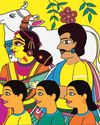
On the morning of November 4, only hours after he declared at a news conference, sniffling and in tears, that the time was right for Marathas to exact vengeance on the Maharashtra government for the economic hardships heaped on the agrarian community, Manoj Jarange Patil returned to face the news crews again. “It is not possible to contest on the basis of only one community,” he said. Muslim and dalit parties, who he had been in talks with until 3am, had not sent lists of candidates they were to jointly back.
Across the Marathwada region of Maharashtra, scores of Maratha candidates who had filed their nomination papers for the November 20 assembly elections were directed to withdraw from the fray. To a question on who or which party/alliance he would direct Maratha voters to reject, Jarange Patil said he would spell out his mandate soon.
Even without an edict from the leader of a series of statewide agitations seeking reservations for Marathas from within the Other Backward Classes quota, the morning announcement on the last date for withdrawal of nominations was an inflection point.
The anger of the Maratha community—almost 31 per cent of the state’s population—is considered one of the biggest factors in the Bharatiya Janata Party-led NDA’s poor show in the Lok Sabha elections this summer.
Amid the post-Haryana election political tailwinds for the Mahayuti combine of the BJP, the Shiv Sena (Eknath Shinde faction) and the Nationalist Congress Party (Ajit Pawar faction), Jarange Patil’s announcement indicated the possibility of a repeat, at least in some regions, of what the Maratha leader himself acknowledged as the Lok Sabha pattern.
Diese Geschichte stammt aus der November 17, 2024-Ausgabe von THE WEEK India.
Starten Sie Ihre 7-tägige kostenlose Testversion von Magzter GOLD, um auf Tausende kuratierte Premium-Storys sowie über 8.000 Zeitschriften und Zeitungen zuzugreifen.
Bereits Abonnent ? Anmelden
Diese Geschichte stammt aus der November 17, 2024-Ausgabe von THE WEEK India.
Starten Sie Ihre 7-tägige kostenlose Testversion von Magzter GOLD, um auf Tausende kuratierte Premium-Storys sowie über 8.000 Zeitschriften und Zeitungen zuzugreifen.
Bereits Abonnent? Anmelden

The day of the knuckle-duster
Several narratives have emerged from the Donald Trump-Volodymyr Zelensky-J.D. Vance dust-up in the Oval office, the most disturbing being the opinion that “Zelensky invited it”.

The AGI dilemma
Spooky and powerful, AGI (Artificial General Intelligence), the planet’s newest technology, has divine benefits, as also diabolical applications that can trigger our destruction.

I want to transform MP into a powerhouse of development
GIS 2025 surpassed expectations in investment commitments, participation, and policy impact.

It is not NEP 2020, it is RSS 2020
TAMIL NADU’S RESISTANCE to the three-language policy under the National Education Policy (NEP) 2020 has reignited the debate over linguistic identity.

Munde blues
Just months into its tenure, the Fadnavis government suffers multiple blows

Plastic buckets and parliament seats
The plastics industry boomed in the 1970s when our rulers told our people to make fewer babies. The dairy industry, already on a high milkmark, should boom if Telugu Desam MP Kalisetti Appalanaidu gets people to make more babies. What’s the connection? Hold on. First listen to India’s population story that’s already a statistical farce, and may soon be a political tragedy.

MDGA-Make Diplomacy Great Again
Must say that all the reports of 'Agent Krasnov' make fascinating reading—like one of those old school, thick-as-a-brick bestsellers that Irving Wallace and Robert Ludlum used to write.

In search of Pampa
Salman Rushdie breathes life to the forgotten goddess Pampa Devi in his novel Victory City (2023).

Centre of attraction
If the enthusiasm at the Global Investors Summit is anything to go by, Madhya Pradesh is poised to write a new chapter of development

RO AND BEHOLD!
As the Champions Trophy win showed, the Rohit Sharma-led veteran brigade might not be over the hill. However, they will have to be on their toes as age and younger talent catch up